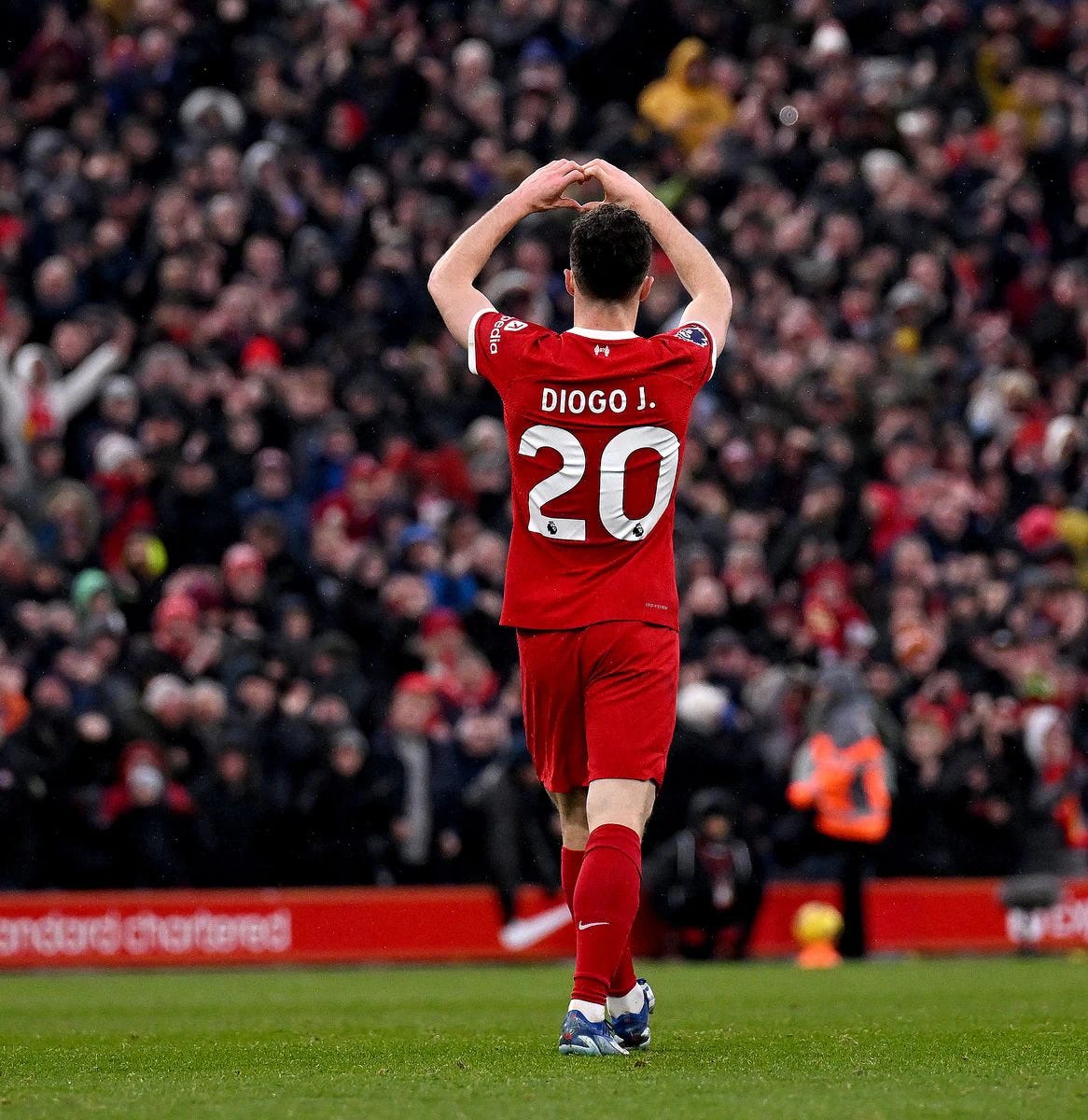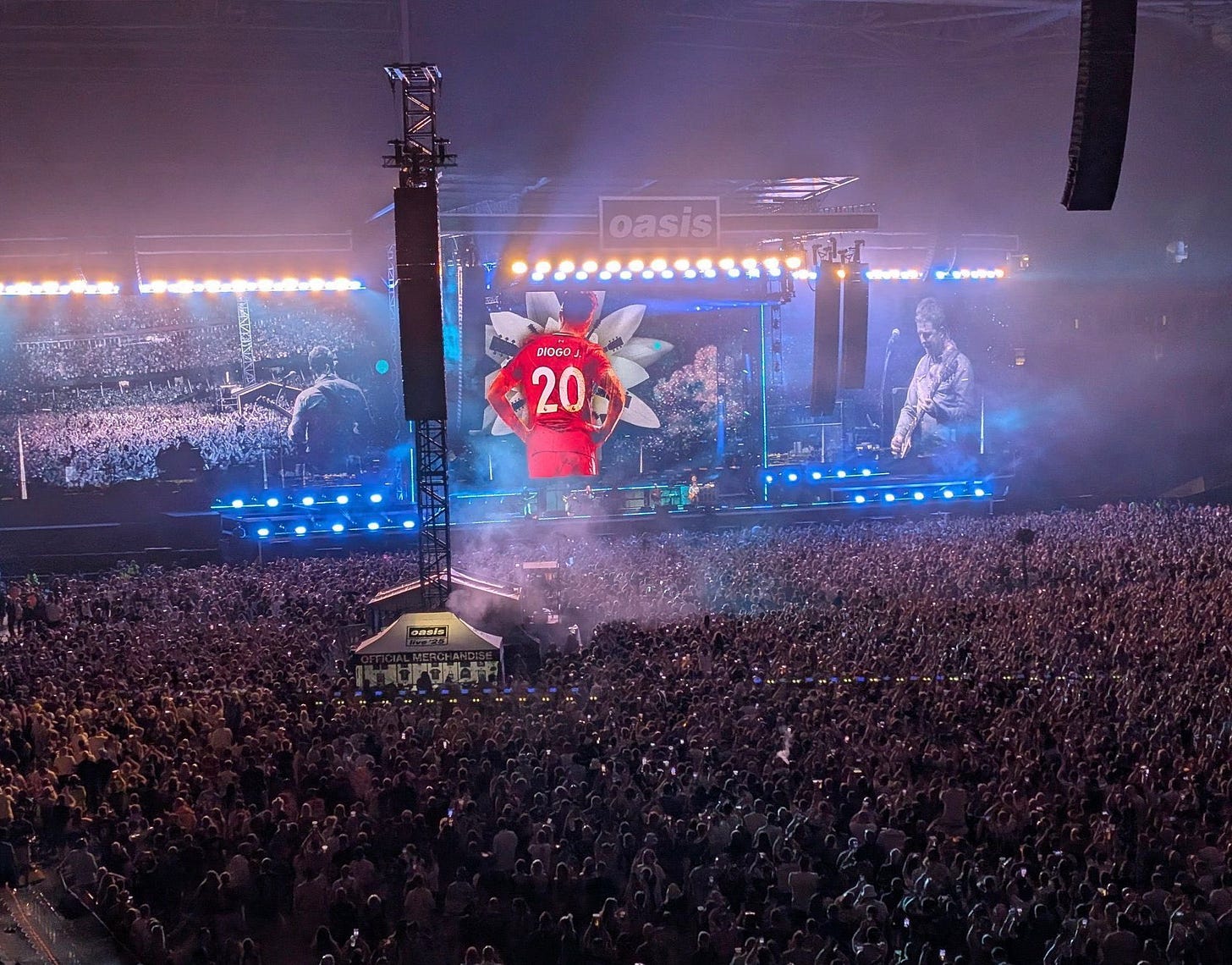Sandcastles
On death, Diogo Jota, and our relationship with his kind
For such a short word, one syllable landing like a stone thrown into still water, you’re never quite ready for the weight of death. Not at your happiest, not at your most despondent. Not while boarding a flight, carrying the touch of what you know will be your last hug with your Grandmum; and not when you’re seeing the word under monochrome pictures on Twitter.
In a 1945 play, The Sport of My Mad Mother, author Jean Giraudoux wrote, “The athlete knows he must die twice, once as an athlete and once as a man.”
I am thinking about this as my timeline turns into a stream of tributes for Diogo Jota, Liverpool and Portugal footballer until the morning of 3rd July, now dead at 28 in a car crash that also took his brother, ten days after marrying his childhood sweetheart.
The television screen beams sunlit pictures from Wimbledon and Edgbaston. Forehands, bouncers, slices. Impossibly talented athletes are making impossible things look very easy. It’s the kind of lazy afternoon when my fingers are magnetically attracted to food delivery applications on my phone. My mind, however, cannot get past Jota. Ollie Pope dives to stop a boundary, and I think of the time Jota leapt into the air, stuck his leg out, and converted a speculative cross into a goal. He was a menace inside the penalty box, modern in his tools but old-school in his appetite. I know this from the heartburn he caused whenever my Manchester United faced his Liverpool. My deepest engagement with him was through a fantasy football game, where, when fit, he was an easy pick.
And yet, if this weird kind of grief, neither personal nor borne out of any intimacy, is gnawing at me, I wonder what must it be like for Jota’s family, friends, teammates, and those who sang his name in front of a screen, sitting in different continents but living his career with him.
We share something almost cosmic with our loved athletes. It takes a mere glance to the left, a shift of the weight, and a bulb in your mind goes of. You’ve watched him since his debut for your team, through the boring draws and tectonic triumphs. Days turned into weeks, weeks into months, and now you know his tells. You know how his shoulders drop fractionally before he springs, the way he leans onto his toes. His shot curls past the far post, the stadium audience groans, but you liked the bend on it. He’s setting his radar; one of the bullets will find the net soon. Knowing a stranger’s movement patterns and favourite brand of ramen is a peculiar kind of intimacy. But there’s comfort in seeing what others miss, in quietly calling someone your own.
You tried that shoulder-drop-and-sprint once, the way younger siblings steal moves from the talented one in the house, and ended up with grass on your tongue. It wasn’t nice to be El Clowno for the rest of the evening, but by the time you peeled off your socks and threw them into the laundry bag, there was an even greater admiration for what you see on the screen every week.
David Foster Wallace, while exploring the sensory experience of watching gifted athletes, once said, “Beauty is not the goal of competitive sports, but high-level sports are a prime venue for the expression of human beauty. The relation is roughly that of courage to war. The human beauty we’re talking about here is beauty of a particular type; it might be called kinetic beauty. Its power and appeal are universal. It has nothing to do with sex or cultural norms. What it seems to have to do with, really, is human beings’ reconciliation with the fact of having a body.”
Perhaps this explains the reverence. Top-level athletes, for whom Giraudoux’s words ring the truest, operate at a physical level unfathomable for the rest of us. They are able to twist their body in shapes, at speeds, that can neither be replicated in words nor through television broadcast. Once you see LeBron and Messi in the flesh, you realise they’re barely even the same species as you.
But it takes an even rarer breed to find a seat next to you, to go from someone whose statistics you can recite in your sleep to someone whose left hamstring raises your blood pressure. Your conversation with them is personal. You talk to them about their latest video game exploits, about the song they have on repeat. Eventually, they become family. Their pictures, the ones you form in your mind, are only ever painted in permanent ink. One day, far in the future, when they decide their bodies have absorbed enough tackles, you imagine them remaining in the orbit: turning up on commentary with a slight double-chin protruding, wearing old colours for charity matches, bringing back that feeling of summer afternoons that melted into wine and cheese evenings.
The tributes for Jota cast a portrait of a man who who became an adopted son and brother to thousands. Andy Robertson speaks about the “mate” who watched the darts and horse racing with him. Coach Arne Slot mourns “the person who never sought popularity but found it anyway. Not a friend to two people, a friend to everyone. Someone who made others feel good about themselves just by being with them. A person who cared deeply for his family.” Journalist Caoimhe O’Neill remembers the “warm quality he had, both in life and on the pitch.” He was a seriously good footballer, and evidently an even better man.

You would think, at the moment of winning the Premier League and an international competition, that someone is at the summit of their lives, soaring through endless sky. So much more to come, a thousand miles before any descent. Diogo Jota was 28, the age when experience begins to sharpen instinct. Centre-forwards often discover second wind here, a decade’s wisdom distilled into movement. His brother, Andre Silva, was 25, the age when athletes begin to unfurl their range, show what they’re capable of.
Even when their kind inevitably must lose altitude, the best don’t decline like the rest of us, don’t develop creaking knees and grey hair as early. The body goes before the mind, and it happens in microseconds: a pass that should have stuck to the inside of the foot instead hits the toe and wobbles away, hamstrings firing a beat too late. The idea of decline germinates only when the late touch becomes pattern, when defenders you once sent the wrong way now jog up casually, when goalkeepers seem to know your chosen corner before you've entered your backswing.
From there begins a long downward spiral of an athlete trying to fight time and their audience arguing against reality. With every passing tide, you become more bullish that the sandcastle can be built back, that enough is left of its foundations. It’s the natural resistance towards acknowledging the erosion of something you thought was indestructible.
You’d think you have time before facing the idea of death. That death, when it has to, comes with a schedule. And you’d be wrong.
Perhaps this is the unspoken passage of our sorrow. After sending prayers to parents who’ve lost two sons in the noon of their lives, to the grieving wife, to three children who’ll never get to hug their dad again, maybe we need a moment for ourselves. We’ll have to reconcile with the album of memories now running in loops, sometimes invited, often ambushing. Each replay will be a reminder of sport’s power and confirmation of the impermanence of our ink, of how quickly sand turns into sediment.
Sportswriters and commentators spend their careers coating mundane events in dramatic paint, fabricating grandeur and darkness. We borrow from mythology, literature, arts, music, even war. Anything, basically, to lend gravitas to our words. Days like this expose the fragile foundations of our language. Imagine telling Diogo Jota’s family or teammates today that a last-minute loss in a derby is a tragedy. Try telling them them that an athlete dies twice.

Over the last couple of days, I have read and watched nearly a dozen Jota interviews. Some about his life in Liverpool, others about more specific football ambitions. And, without exception, he radiates joy. You can see his toothy smile even as you’re reading the transcript of a carefully-curated media interaction. This essay, from 2023, explores Jota’s incredible range as a footballer, but ends with his perspective on life.
On the pitch he is busy and off it is the same. Jota’s fiancee Rute Cardoso gave birth to the couple’s second child in March. Balancing life as a father, professional athlete and gamer is not easy but Jota counts his blessings.
“It’s nice to be alive,” he says. “I just want to live my life and try to be happy.”
Rest easy, Diogo Jota.


I wanted to pin some parts of this and respond in comments but I realised I would need to pin the whole post.
I came looking for your write up. I think you know why. I hope you don't remember why.
Back when I was growing up, I had a similar relationship with a tennis elbow of a certain player. Because of him I never smoked growing up and have never smoked a cigarette when it was all to easy to smoke. I want to forget all what that player has done off the field because he has never been as candid as Jota was in that quote that ends this fabulous post.
I don't follow football and I cannot name any league but I just came here to read your post to share grief.
This was hard to read Sarthak. But you captured some of the difficulties of articulating how tragic and sudden all of this was in the life of that athlete. Thanks for this reflective piece Sarthak and for expanding the scope of sports writing for me as a reader. These players dedicate their lives to this game and it is so unfair that this happened to him and his family.